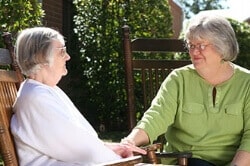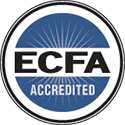Guidelines for Dealing with an Aging Parent

By Dr. Tim Setzer
As parents age, new challenges also arise for their adult children. Sometimes it seems the roles have reversed and you are the one who is now giving advice and being protective. There are frustrations every child of an aging parent must deal with. Some are major, most are minimal. Our parents experience physical challenges, whether it is sight, hearing or even the ability to walk. They also may experience mental and emotional challenges. Their memory may be failing. Their ability to weigh their comments before speaking may be diminished and decision making isn’t what it used to be. All of these and more are a normal part of aging and a part of being the child of an aging adult. Are there guidelines that show us how to handle these situations?
Old age is a blessing from God. Psalm 91 speaks of the person “who dwells in the shelter of the Most High and rests in the shadow of the Almighty.” This Psalm is talking about Christ, but does not minimize the blessings promised to those who depend on God. Verse 16 expresses one such blessing: “With long life will I satisfy him, and show him my salvation” (Psalms 91:16). There isn’t space enough in this article to list all the other verses of Scripture that speak to old age being a blessing, but suffice it to say that Scripture is very clear; long life is a blessing from God.
Scripture speaks of people being full of days or full of years (1 Chronicles 23:1, Job 42:17). Being full of days is directly related to being old. To be old is the fullness or filling up of life. When a person does not reach old age, we say that person’s life is cut short, it was not full. If old age is the fullness of living, it is something to look forward to and to enjoy.
All human life is valuable and worthy of respect because we are created in the image of God (Genesis 9:6). Older adults are often treated poorly in our society because we have lost sight of the intrinsic value of all life. “The general attitude of a culture toward its aged is determined by its predominant view of human life, its values and its destiny.” Older adults are human beings and therefore, worthy of honor and respect.
Scripture commands an attitude of respect toward parents. The Ten Commandments state “Honor your father and your mother, so that you may live long in the land the LORD your God is giving you” (Exodus 20:12). Parents are worthy of respect and the Bible commands it, but do we realize these commands were given to adults who had parents? These commands, although they apply to young children, were written to adults. A parent was to receive respect and honor from children, no matter how old the children may be. When a person retired, they transferred all their possessions to their children, especially the oldest son. It was then the responsibility of the children to care for their parents. When a person became old, the children bore the responsibility of caring for them, including their burial when they died. Paul said to Timothy, “Anyone who does not provide for their relatives, and especially for their own household, has denied the faith and is worse than an unbeliever” (1 Timothy 5:8 (NIV)).
Leviticus 19:32 says, “Rise in the presence of the aged, show respect for the elderly and revere your God. I am the LORD.” Older adults were to be held in such high esteem that when they entered a room everyone would stand.
I was asked to write about being the child of an aging parent because this is my situation. My mom is 85 and lives independently at Advent Christian Village. She has macular degeneration which means she has great difficulty seeing. I count it an honor and a blessing to be able to see her as often as I wish and to help her with her needs. Like anyone in this phase of life, there are many questions and most have very subjective answers.
To give specific ways of dealing with all the issues of our parent’s aging may be helpful, but they are only my opinion. Every situation is different and in every case we need to lean on God for wisdom. But there is something I can tell you that is not my opinion; it’s God’s word to us. Growing old is a blessing and the older adult is to be respected. As in every relationship, being a child of an aging parent is not about us, it’s about them. It requires sacrifice and patience; it requires thinking more of them than we do of ourselves. If we seek to make the blessing of growing old a reality for our aging parents and if we show them sincere respect and honor, most of our questions are answered.



